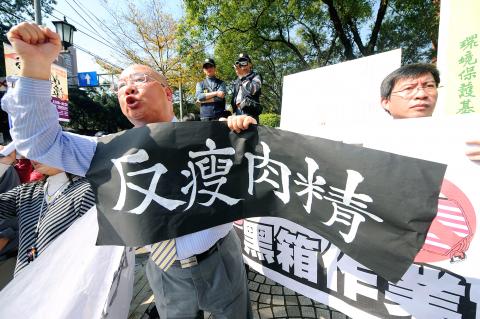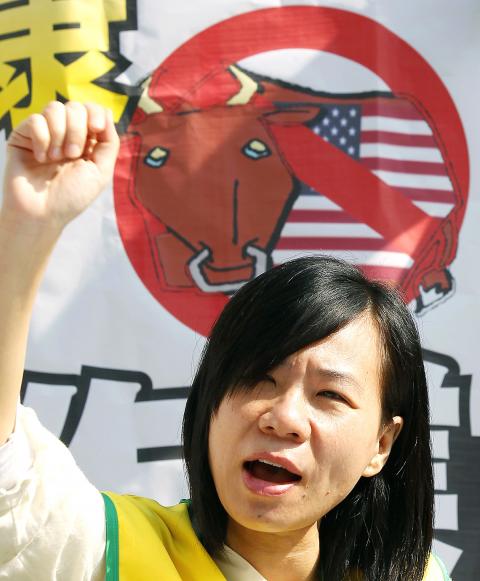An expert who had been invited to give his views at an inter-ministerial meeting on the issue of US beef imports yesterday left about 10 minutes after the meeting began, saying that the process was not transparent.
Chou Chin-cheng (周晉澄), dean and chairman of the Institute of Veterinary Clinical Science at National Taiwan University’s School of Veterinary Medicine, walked out of the meeting — the second to be held on the controversy surrounding ractopamine residue in US beef imports — after his request that the Council of Agriculture make the transcripts of the meeting public was rejected.
“The government has to publicize all the information it bases its decisions on, regardless of whether the information is correct or incorrect,” Chou told reporters.

Photo: CNA
He said he was the only participant who wanted the council to provide either a transcript or video of the meeting to the public.
If the government really welcomes various opinions, the different views expressed in the meeting should be made public — not just the conclusions, Chou said.
Chou said he would attend the next committee meeting if invited, but would again insist that the discussions be made public.

Photo: Pichi Chuang, Reuters
At a press conference afterward, Council of Agriculture Deputy Minister Hu Sing-hwa (胡興華) said a majority of the participants were in favor of a closed-door meeting and opposed the release of a transcript so they could speak freely.
Democratic Progressive Party Legislator Tien Chiu-chin (田秋堇) and Taiwan Solidarity Union Legislator Lin Shih-chia (林世嘉) led about 30 people from nine civic groups in a small protest outside the council’s headquarters as the meeting was being held.
“We have three demands. First, as the issue is a public health matter, there is no room for compromise with the US. Second, the council has to open all of its meeting records for public inspection. Third, the committee should be reshuffled,” Homemakers’ Union and Foundation chairperson Chen Man-li (陳曼麗) said.
While the first meeting on the issue was criticized for being one-sided, several experts from the private sector who oppose the use of ractopamine in animal feed were invited to yesterday’s meeting, although they were in the minority.
Premier Sean Chen (陳冲) said the government would intensify its efforts to enforce control measures on feed additives.
His comments came after reports that traces of ractopamine residue had been found in US beef products in the local market.
The government could increase the inspection rate on US beef imports or revoke licenses from importers that fail to enforce restrictions on US beef imports that contain ractopamine residue, Chen said.
His comments came after some hypermarket chains, including Carrefour, RT-Mart and A-Mart, temporarily removed US beef products from their shelves after the products were found to contain traces of ractopamine.
“The use of beta-agonists [like ractopamine] is still banned. Sale of any meat which contains the substance is illegal.” the premier said.
Importers found violating the regulation would be subject to higher border inspection rates or could have import permits revoked,” he said.
Under pressure from Washington, where research has shown that ractopamine, a leanness-promoting agent, is used in the raising of 45 percent of US pigs and 30 percent of ration-fed cattle, the government has resigned itself to considering lifting the ban.
It is holding a series of inter-ministerial committee meetings to address the issue and set up a task force to re-examine the health risks surrounding ractopamine.
The moves have ignited consumer concerns over the safety of US beef. Local authorities recently began testing samples of US beef sold at hypermarkets to ascertain whether residue from drugs banned in Taiwan could be detected.
Two samples of US beef sold at RT-Mart and Carrefour in Taipei were found to have ractopamine residue, among a total of six items tested; in Greater Kaohsiung, traces of ractopamine were found in three of six items sold at Dollars and RT-Mart.
Kung Tsau-lien (鞏彩蓮), a representative of RT-Mart, said that all US beef products sold by the company were accompanied with certificates of export and certificates of quarantine from the US, as well as certificates of compliance issued by the Department of Health and the Council of Agriculture.
“It seems that [the certificates] were not enough,” Kung said.
Carrefour public relations manager Ho Mo-chen (何默真) said the company had pulled all US beef products from shelves and referred the products for testing.
“To safeguard consumers’ interest, we would not put them on the shelves unless they are assured it is ractopamine-free,” she said.
Additional reporting by CNA

SECURITY: As China is ‘reshaping’ Hong Kong’s population, Taiwan must raise the eligibility threshold for applications from Hong Kongers, Chiu Chui-cheng said When Hong Kong and Macau citizens apply for residency in Taiwan, it would be under a new category that includes a “national security observation period,” Mainland Affairs Council (MAC) Minister Chiu Chui-cheng (邱垂正) said yesterday. President William Lai (賴清德) on March 13 announced 17 strategies to counter China’s aggression toward Taiwan, including incorporating national security considerations into the review process for residency applications from Hong Kong and Macau citizens. The situation in Hong Kong is constantly changing, Chiu said to media yesterday on the sidelines of the Taipei Technology Run hosted by the Taipei Neihu Technology Park Development Association. With

CARROT AND STICK: While unrelenting in its military threats, China attracted nearly 40,000 Taiwanese to over 400 business events last year Nearly 40,000 Taiwanese last year joined industry events in China, such as conferences and trade fairs, supported by the Chinese government, a study showed yesterday, as Beijing ramps up a charm offensive toward Taipei alongside military pressure. China has long taken a carrot-and-stick approach to Taiwan, threatening it with the prospect of military action while reaching out to those it believes are amenable to Beijing’s point of view. Taiwanese security officials are wary of what they see as Beijing’s influence campaigns to sway public opinion after Taipei and Beijing gradually resumed travel links halted by the COVID-19 pandemic, but the scale of

A US Marine Corps regiment equipped with Naval Strike Missiles (NSM) is set to participate in the upcoming Balikatan 25 exercise in the Luzon Strait, marking the system’s first-ever deployment in the Philippines. US and Philippine officials have separately confirmed that the Navy Marine Expeditionary Ship Interdiction System (NMESIS) — the mobile launch platform for the Naval Strike Missile — would take part in the joint exercise. The missiles are being deployed to “a strategic first island chain chokepoint” in the waters between Taiwan proper and the Philippines, US-based Naval News reported. “The Luzon Strait and Bashi Channel represent a critical access

Pope Francis is be laid to rest on Saturday after lying in state for three days in St Peter’s Basilica, where the faithful are expected to flock to pay their respects to history’s first Latin American pontiff. The cardinals met yesterday in the Vatican’s synod hall to chart the next steps before a conclave begins to choose Francis’ successor, as condolences poured in from around the world. According to current norms, the conclave must begin between May 5 and 10. The cardinals set the funeral for Saturday at 10am in St Peter’s Square, to be celebrated by the dean of the College